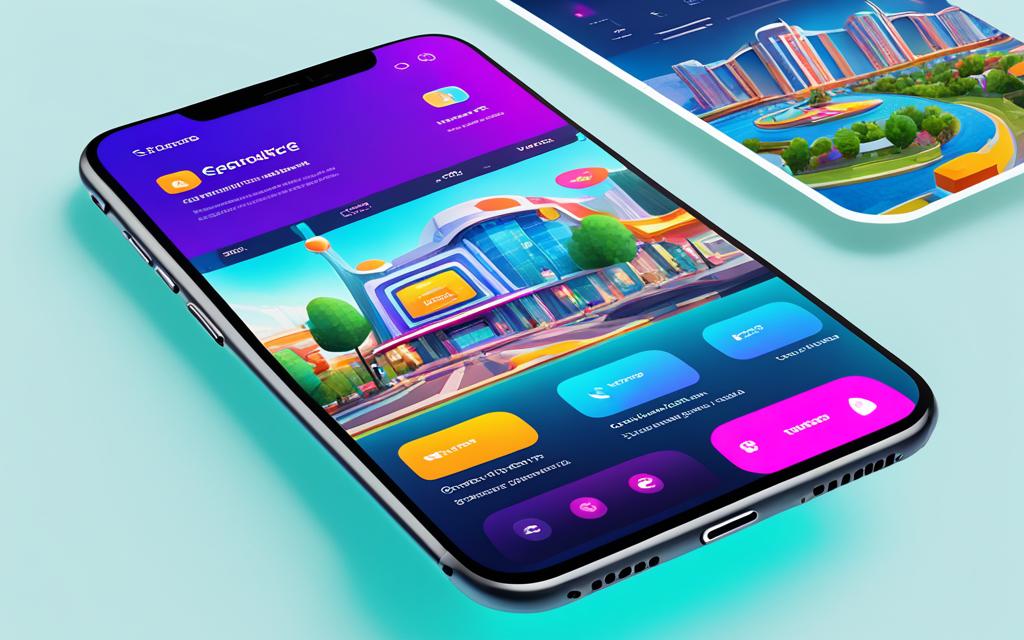In today’s digital age, mobile apps have become an integral part of our leisure activities. From gaming to travel, fitness, and entertainment, mobile apps offer a myriad of opportunities to elevate our leisure experiences. But beyond the realm of gaming, there is a new wave of mobile apps that are taking leisure to luxurious heights. These apps go beyond providing mere entertainment, creating transformative and immersive experiences that redefine the concept of leisure.
Mobile app development and design are at the forefront of this movement. Developers are pushing the boundaries of technology to create apps that not only engage and entertain but also provide a luxurious and sophisticated experience. From the architectural design to the user interface, every aspect of these apps is meticulously crafted to deliver an unparalleled leisure experience.
So, what are the latest trends in mobile app development, design, and architecture that contribute to the creation of these luxurious experiences? Let’s dive deeper and explore the fascinating world of mobile apps that go beyond gaming and truly transform leisure into luxurious play.
Key Takeaways:
- Mobile apps have evolved to offer transformative and immersive leisure experiences.
- Developers are integrating luxury and sophistication into the design and architecture of mobile apps.
- The latest trends in mobile app development contribute to the creation of luxurious experiences.
- These apps go beyond gaming and redefine the concept of leisure.
- Mobile apps are shaping the future of leisure, offering endless possibilities for immersive and luxurious experiences.
The Rise of the Metaverse and Its Influence on Mobile Apps
In this section, we will explore the rise of the metaverse and how it is shaping the landscape of mobile apps. The metaverse, a concept that has gained significant traction in recent years, refers to a virtual universe where users can interact with a computer-generated environment and other users in real-time. It offers a seamless integration of virtual and physical worlds, creating a new dimension of digital experiences.
Understanding the Metaverse Concept
The metaverse is a convergence of various emerging app technologies, such as augmented reality (AR), virtual reality (VR), blockchain, and artificial intelligence (AI). These technologies work together to create a highly immersive and interactive digital environment that blurs the lines between the physical and virtual realms.
One of the key characteristics of the metaverse is its ability to provide users with a sense of presence and agency within the virtual world. Users can explore, create, and interact with digital content, objects, and other users, making the metaverse a platform for limitless possibilities.
Technological Convergence Shaping the Metaverse
The metaverse is made possible by the technological convergence of various app development trends. VR and AR technologies enable users to experience the metaverse through immersive headsets or smartphone screens. Blockchain technology facilitates secure transactions and ownership of digital assets within the metaverse. AI-powered algorithms enhance user experiences, providing personalized and context-aware interactions.
As these technologies continue to advance, we can expect further integration and refinement of the metaverse concept, leading to more seamless and immersive experiences for mobile app users.
Projected Growth and Market Opportunities
The metaverse presents significant growth potential and market opportunities for mobile app developers. Industry experts predict that the metaverse market will experience substantial growth in the coming years, driven by advancements in technology and increasing user demand for immersive digital experiences.
As the metaverse evolves, it will open up new avenues for innovation in gaming, entertainment, social networking, education, and other industries. Mobile apps will play a crucial role in providing access to the metaverse, offering users convenient and immersive experiences on their smartphones and tablets.
With the rise of the metaverse, developers have the opportunity to create transformative mobile apps that redefine leisure, entertainment, and communication in the digital age. By leveraging emerging app technologies and capitalizing on the projected growth of the metaverse market, developers can stay at the forefront of the mobile app industry.
In the next section, we will explore the latest advancements in mobile app development and design, as well as the integration of emerging technologies into mobile apps. Stay tuned!
Mobile App Development and Trends
When it comes to mobile app development and design, staying up-to-date with the latest trends and advancements is crucial. In this section, we will explore the evolving landscape of app development and delve into the integration of emerging technologies that are shaping the future of mobile apps.
Advancements in App Design and User Experience
App design plays a critical role in attracting and retaining users. As user expectations continue to evolve, app designers are constantly adapting and experimenting with new design trends. User experience (UX) has emerged as a key focus area, with the aim of creating intuitive and seamless interactions for users.
One of the prominent trends in app design is the emphasis on minimalistic and clean interfaces. This approach prioritizes simplicity and ease of use, allowing users to navigate through the app effortlessly. Additionally, personalized and interactive elements are being incorporated to enhance user engagement and create unique experiences.
Another important aspect of app design is accessibility. With the increasing usage of mobile apps by a diverse range of users, it is essential to ensure inclusivity and eliminate barriers. Designing for accessibility involves considering factors such as color contrast, font size, and screen reader compatibility to make the app accessible to all users.
Integration of Emerging Technologies in Apps
The integration of emerging technologies has revolutionized the mobile app development landscape. These technologies not only enhance the functionality and performance of apps but also provide new avenues for innovation and user engagement.
Augmented reality (AR) and virtual reality (VR) have gained significant traction in recent years, creating immersive and interactive experiences. AR and VR technologies are being used in various industries, such as gaming, education, and retail, to offer users a completely new way of interacting with content.
Artificial intelligence (AI) is another key technology driving app development. AI-powered features, such as intelligent chatbots and personalized recommendations, enhance user experiences by providing tailored and relevant content. Chatbots have become increasingly popular in customer service apps, offering instant support and assistance to users.
Blockchain technology is also finding its way into mobile app development, particularly in the finance and healthcare sectors. Its decentralized and secure nature provides opportunities for building trust and enabling secure transactions within apps.
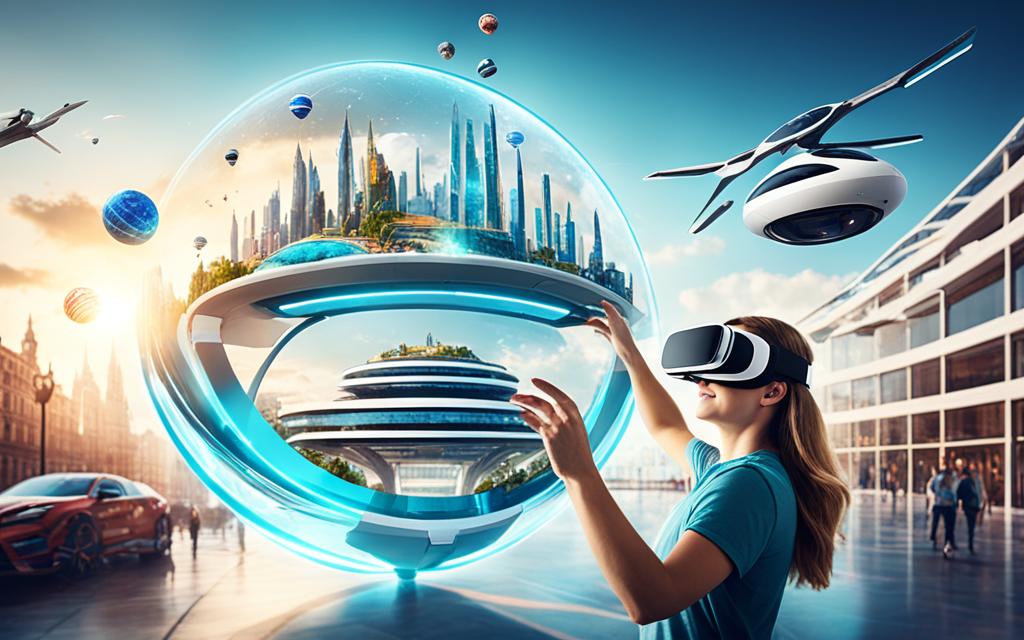
As app development continues to evolve, adhering to best practices is essential for delivering high-quality and successful apps. These best practices include thorough testing and debugging to ensure app stability, using agile development methodologies for faster iterations, and continuously gathering user feedback to improve the app’s features and functionality.
By staying informed about the latest trends and advancements in mobile app development and design, developers can create innovative and engaging apps that meet the evolving needs of users.
Enhancing Leisure with Mobile App Innovation
In today’s digital age, mobile app innovation has revolutionized the way we experience leisure activities. From fitness and travel to entertainment, mobile apps have transformed everyday activities into immersive and virtual experiences, offering users a new level of engagement and satisfaction.
From Everyday Activities to Virtual Experiences
Mobile apps have reimagined leisure activities by leveraging cutting-edge technologies and innovative features. Whether it’s using a fitness app that gamifies workouts with virtual challenges or exploring far-off destinations through a travel app’s virtual reality tours, the possibilities are endless. These apps have successfully bridged the gap between the physical and digital worlds, providing users with unique and captivating experiences.
For example, fitness apps like Nike Training Club and Fitbod utilize mobile app innovation to enhance workout routines. Through interactive videos, personalized training plans, and virtual coaches, these apps make exercising more enjoyable and effective. Users can track their progress, compete with friends, and even unlock virtual rewards, creating a dynamic and engaging fitness experience.
Similarly, travel apps such as Airbnb and Google Earth VR allow users to explore new destinations from the comfort of their homes. By incorporating virtual reality technology, these apps provide realistic and immersive travel experiences. Users can virtually visit famous landmarks, wander through exotic landscapes, and even book accommodations, all within the app.
Entertainment apps have also embraced mobile app innovation to offer virtual experiences that go beyond traditional forms of leisure. Popular apps like Netflix and Spotify use personalized recommendations, interactive features, and immersive interfaces to enhance the user’s entertainment journey. These apps curate content based on user preferences, allowing for a customized and engaging entertainment experience.
By leveraging mobile app innovation, these apps have not only transformed leisure activities but also elevated them to new heights. The seamless integration of technology and immersive user experiences has redefined what it means to relax, explore, and entertain in the digital era.
| Benefits of Mobile App Innovation in Leisure Activities | Impact on User Engagement and Satisfaction |
|---|---|
| Enhanced interactivity | Increased user engagement through gamification and interactive features |
| Access to virtual experiences | Expanded opportunities for users to explore and immerse themselves in virtual environments |
| Personalization | Customized experiences tailored to user preferences and interests |
| Convenience | Seamless integration into daily routines, providing on-demand and accessible leisure experiences |
| Community engagement | Opportunities for social interaction and connection with like-minded individuals |
Mobile app innovation has undoubtedly revolutionized the way we engage with leisure activities. As technology continues to advance, we can expect even more immersive and transformative experiences that blur the boundaries between the physical and digital realms.
Transforming User Experience with Augmented and Virtual Reality
In today’s rapidly evolving digital landscape, augmented reality (AR) and virtual reality (VR) are revolutionizing the way we interact with mobile applications. These technologies have opened up new horizons in mobile app development, offering immersive experiences that bridge the gap between the real and virtual worlds. AR and VR have found wide-ranging applications in various industries, including gaming, entertainment, and education, transforming the user experience in unprecedented ways.
AR and VR: New Horizons in Mobile Applications
Augmented reality (AR) overlays virtual content onto the real world, enhancing our perception and interaction with the environment. This technology has paved the way for groundbreaking applications in several fields. For instance, in the entertainment industry, AR has enabled users to embrace interactive experiences through mobile apps. Whether it’s exploring virtual museums, trying on virtual outfits, or playing location-based AR games, users can now enjoy immersive and engaging experiences with their smartphones.
Virtual reality (VR), on the other hand, transports users into completely virtual environments, providing an unparalleled sense of presence and immersion. With VR mobile apps, users can step into virtual worlds and engage with content in ways that were previously impossible. From gaming to virtual tours, VR offers a deeply immersive experience, allowing users to escape reality and explore new realms.
AR and VR technologies have also disrupted the education industry, enabling immersive learning experiences. Mobile apps that incorporate AR and VR elements provide students with the opportunity to visualize complex concepts, explore historical events, and engage in interactive simulations, bringing education to life in unprecedented ways.
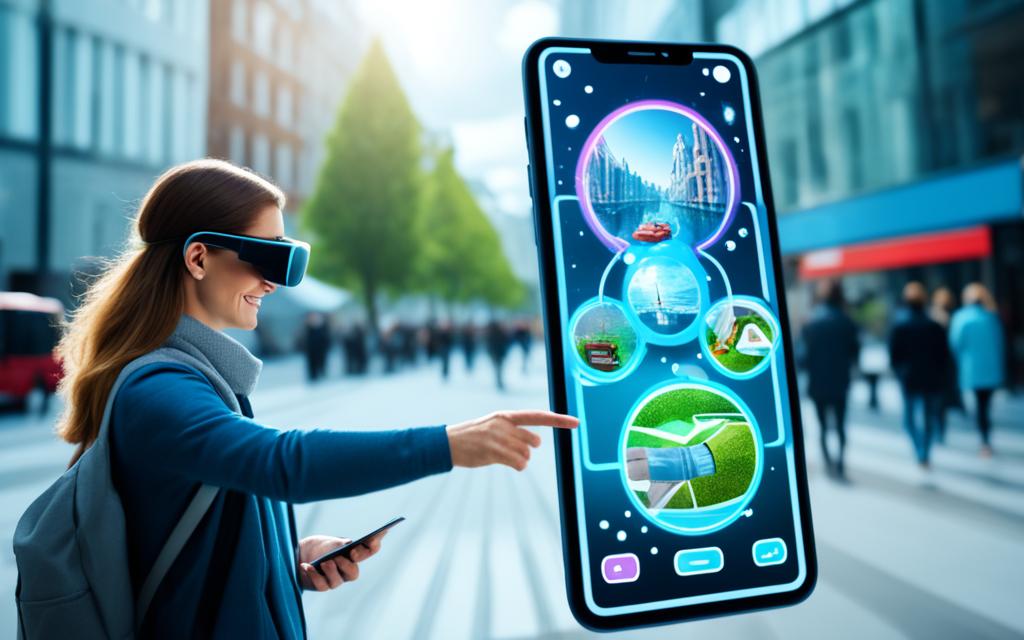
Case Studies: AR and VR Shifting the Entertainment Paradigm
To better understand the transformative power of AR and VR in mobile apps, let’s take a look at some case studies that showcase their impact on the entertainment industry.
One notable example is Pokémon GO, a mobile game that combines AR technology with the beloved Pokémon franchise. The game allows players to explore the real world while encountering virtual Pokémon creatures through their smartphones. Pokémon GO’s success sparked a global phenomenon, illustrating the immense potential of AR in creating engaging and interactive gaming experiences.
In the realm of virtual reality, Oculus VR, now owned by Facebook, has revolutionized the gaming industry with its Oculus Rift headset. This VR device provides a fully immersive gaming experience where players can dive into virtual worlds and interact with their environments. The Oculus Rift has set a new standard for VR gaming, demonstrating the extraordinary possibilities of the technology.
These case studies exemplify how AR and VR have shifted the entertainment paradigm, offering users unprecedented levels of interactivity, immersion, and enjoyment. As mobile app development continues to embrace AR and VR technologies, we can expect to see even more awe-inspiring and innovative experiences in the future.
Evolving App Development Landscape: Platforms and Tools
In today’s rapidly evolving digital landscape, mobile app development is at the forefront of technological advancements and user demands. As the popularity of mobile apps continues to soar, developers are constantly seeking innovative app development platforms and tools to create cutting-edge applications. This section will explore the dynamic landscape of app development platforms and tools, examining the features, advantages, and limitations they offer.
When it comes to app development platforms, there is a wide array of options to choose from. These platforms provide developers with the foundation and frameworks necessary to build robust and scalable mobile applications. Some popular app development platforms include:
- Apple iOS: Apple’s iOS platform, with its extensive set of development tools and resources, allows developers to create high-quality applications for iPhones, iPads, and other Apple devices. The iOS platform offers comprehensive support for the latest app design strategies and trends, enabling developers to deliver seamless user experiences.
- Android: Google’s Android platform, known for its wide user base and flexibility, provides developers with a range of tools and frameworks for building Android applications. With its open-source nature, Android allows for greater customization and integration of app design strategies.
- Cross-Platform: Cross-platform app development platforms like React Native and Xamarin have gained popularity in recent years. These platforms enable developers to write code once and deploy it across multiple platforms, saving time and resources in the development process.
In addition to app development platforms, developers also rely on a variety of tools to streamline their development workflows and enhance productivity. These tools encompass a wide range of functionalities, including:
- Integrated Development Environments (IDEs): IDEs like Xcode (for iOS) and Android Studio (for Android) provide a comprehensive set of tools for coding, debugging, and testing mobile applications. They offer intuitive interfaces and powerful features that facilitate efficient development processes.
- Backend-as-a-Service (BaaS) Providers: BaaS providers like Firebase and AWS Amplify simplify backend development by offering pre-built serverless infrastructure and APIs. These tools reduce the need for complex server setup and maintenance, allowing developers to focus on the frontend development and app design strategies.
- Prototyping and Design Tools: Tools like Sketch, Figma, and Adobe XD enable developers and designers to create interactive app prototypes and visually appealing user interfaces. These tools facilitate effective collaboration between developers and designers and promote the implementation of user-centered app design strategies.
As the app development landscape continues to evolve, new platforms and tools are constantly emerging. Developers must stay updated with the latest trends and advancements to harness the full potential of these technologies. Emerging app design strategies and trends, such as microservices architecture, progressive web apps, and low-code development, are reshaping the app development landscape and offering new avenues for creating innovative and high-performing mobile applications.
By leveraging the right app development platforms and tools, developers can tailor their apps to meet the ever-changing needs and expectations of users. Whether it’s choosing the most suitable platform for their target audience or opting for tools that enhance efficiency and productivity, the app development landscape provides developers with the resources they need to create extraordinary mobile experiences.
Mobile App Monetization Strategies
In today’s competitive app market, monetizing mobile apps has become a crucial aspect of app development and sustainability. In this section, we will explore effective strategies for maximizing revenue through app monetization. We will discuss different app monetization models, such as in-app purchases, subscriptions, and advertising, and evaluate their potential impact on revenue generation.
In-App Purchases: One popular app monetization strategy is incorporating in-app purchases. This model allows users to make additional purchases within the app, such as virtual goods, premium features, or content upgrades. By offering valuable and engaging in-app purchases, developers can generate a significant revenue stream while adding value to the user experience.
Subscriptions: Another effective app monetization strategy is offering subscription-based services. This model allows users to access premium content or services on a recurring basis, typically monthly or annually. By providing compelling subscription packages and continuous updates, developers can establish a reliable income stream while fostering long-term user engagement.
Advertising: Advertising remains a prevalent monetization strategy in the app industry. Developers can integrate various ad formats, such as banner ads, interstitial ads, or rewarded videos, to display advertisements within their apps. By partnering with ad networks or implementing ad mediation solutions, developers can earn revenue based on impressions, clicks, or ad interactions.
App Store Optimization: To enhance revenue potential, app store optimization (ASO) plays a crucial role. ASO involves optimizing app metadata, including keywords, app title, and description, to improve its visibility and discoverability in app store searches. Additionally, developers can encourage positive user reviews and ratings, which contribute to higher app rankings and increased downloads.
App Development Strategies: Successful monetization also requires strategic planning during the app development process. Developers must consider monetization opportunities from the initial conceptualization stage. By integrating monetization features seamlessly into the app’s user experience, developers can strike the right balance between generating revenue and maintaining user satisfaction.
To illustrate these strategies further, let’s take a look at a table showcasing the different app monetization models and their respective advantages and considerations:
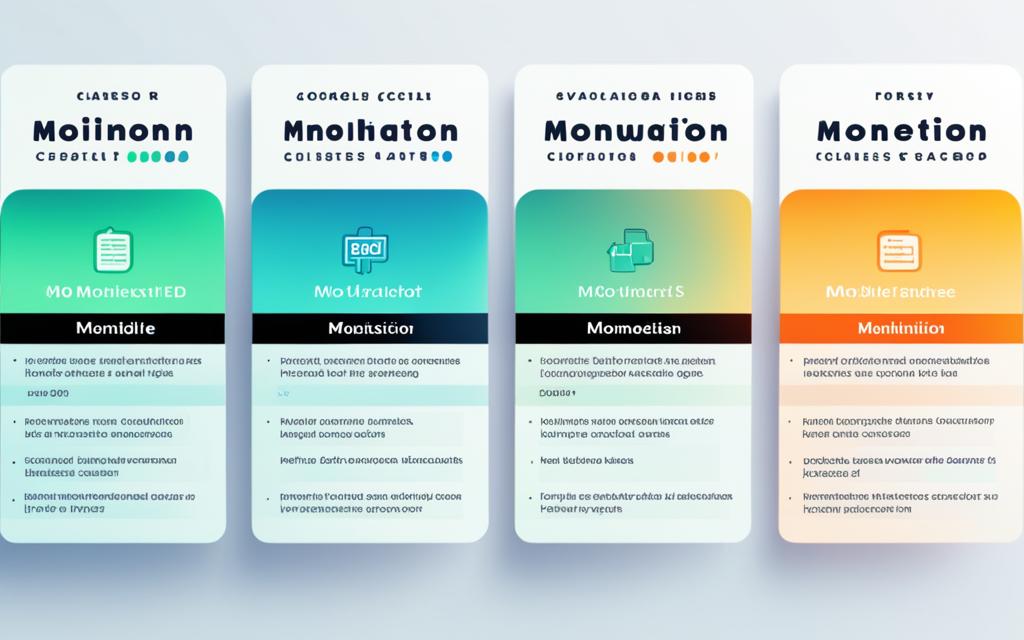
By leveraging these mobile app monetization strategies and optimizing the app’s revenue potential, developers can create sustainable app businesses while delivering value to their users.
The Art of Creating Communities through App Architecture
In today’s digital landscape, app architecture plays a crucial role in cultivating user interaction and loyalty. A well-designed app architecture not only enhances the user experience but also contributes to the creation of vibrant and engaged app communities. By understanding the principles and strategies behind app architecture, developers can design apps that promote digital sociability and facilitate meaningful connections among users.
Cultivating User Interaction and Loyalty
App architecture defines the structure, layout, and functionality of an app. When thoughtfully designed, it can encourage users to interact with the app, explore its features, and become loyal members of the app community. The architecture should enable seamless navigation, intuitive interfaces, and smooth transitions, ensuring that users can effortlessly engage with the app’s content and functionalities.
Moreover, user interaction should be a key consideration throughout the app development process. By implementing interactive elements such as gamification features, social sharing capabilities, and personalized recommendations, app developers can create opportunities for users to actively participate and engage with the app. These interactive features not only enhance the user experience but also foster a sense of belonging and community among users.
User loyalty is another important aspect of app architecture. By providing users with a seamless and enjoyable experience, apps can foster loyalty and encourage users to continue using the app over time. Loyalty programs, exclusive content, and personalized experiences can incentivize users to stay engaged and actively participate in the app community.
Designing for Digital Sociability in Apps
Digital sociability refers to the ability of an app to facilitate social connections, interactions, and community building among users. When designing apps, it is important to incorporate features and functionalities that promote digital sociability. This can be achieved through various means:
- Integration with social media platforms: Allowing users to connect their app profiles to their social media accounts enables them to easily find and engage with friends and contacts within the app.
- Chat and messaging features: Providing built-in messaging capabilities allows users to communicate, collaborate, and share experiences within the app. This promotes interactions and fosters a sense of community.
- User-generated content: Allowing users to create and share their own content within the app encourages engagement and participation. User-generated content can include reviews, ratings, comments, and user-generated challenges or competitions.
By designing apps that prioritize digital sociability, developers can build communities where users feel connected, valued, and motivated to interact with each other.
App architecture is a powerful tool for creating communities within mobile apps. By understanding its impact on user interaction, loyalty, and digital sociability, developers can design apps that not only provide exceptional user experiences but also foster vibrant and engaged app communities.
Luxuriously Layered Experiences in Mobile Gaming
When it comes to mobile gaming, the industry has evolved far beyond simple entertainment. Mobile games are now merging gameplay with luxury and lifestyle elements, creating a new genre of immersive and sophisticated gaming experiences.
This trend of luxe gaming experiences is transforming how players engage with mobile games. It goes beyond traditional gaming mechanics, introducing elements of luxury and lifestyle into the gameplay to create a multi-dimensional experience.
With the advancements in mobile app development and trends, game developers are leveraging high-quality graphics, captivating narratives, and personalized features to cater to players seeking more than just entertainment. They are crafting game worlds that immerse players in luxurious settings, where they can experience opulence and indulgence.
This integration of luxury and lifestyle elements into mobile gaming opens up a world of possibilities for players. From virtual fashion shows and high-end virtual real estate to luxury car racing and celebrity-studded game events, the gaming lifestyle has never been more enticing.
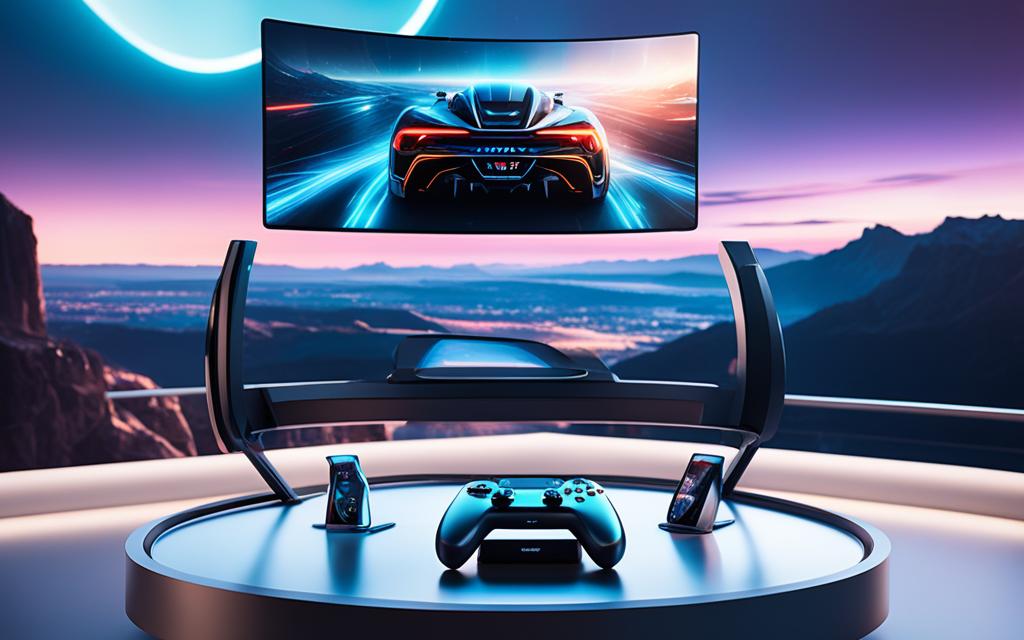
“Mobile gaming has elevated the player experience by merging the best of both worlds – immersive gameplay and luxurious lifestyles.” – Gaming enthusiast
The impact of these luxuriously layered experiences goes beyond entertainment. They shape the gaming lifestyle, blurring the lines between virtual and real-world experiences. Players can now engage in activities that were once exclusive to the elite, but now accessible to anyone with a smartphone.
Furthermore, these luxe gaming experiences encourage player engagement and long-term loyalty. Players are drawn to the meticulously designed game worlds that offer a glimpse into the luxurious lifestyle they aspire to. This creates a sense of exclusivity and achievement, driving them to invest more time and effort into the game.
As mobile app development continues to evolve, we can expect the trend of merging gameplay with luxury and lifestyle to grow further. Game developers will push the boundaries of technology and creativity to deliver unforgettable gaming experiences that transport players into realms of extravagance and glamour.
So, if you’re looking to explore mobile gaming like never before, prepare yourself for an extraordinary journey through the world of luxe gaming experiences.
App Store Optimization and Visibility
In the competitive landscape of mobile app development and trends, having a great app is not enough. To ensure its success, app store optimization and visibility strategies play a crucial role. By implementing effective optimization techniques, developers can significantly improve the visibility of their mobile apps in app stores, increasing the chances of user discovery.
One of the key techniques for app store optimization is keyword research. By identifying the right keywords relevant to the app’s functionality and target audience, developers can optimize the app’s metadata, including the title, description, and keywords. This helps improve the app’s search ranking and visibility when users search for relevant terms in app stores.
Another important aspect of app store optimization is app store ratings and reviews. Positive ratings and reviews not only enhance the app’s visibility but also build credibility and trust among potential users. Acquiring positive reviews and actively responding to user feedback can significantly impact the app’s overall success in app stores.
Additionally, optimizing the app’s icon, screenshots, and preview videos can greatly enhance its visibility. A visually appealing icon and compelling screenshots can capture the attention of users browsing app stores, prompting them to click and explore further. Preview videos provide an opportunity to showcase the app’s features and functionality, further enticing potential users to download the app.
App store optimization goes hand in hand with effective mobile app marketing. By utilizing various marketing channels such as social media, content marketing, influencer collaborations, and app install campaigns, developers can drive targeted traffic to their app’s page in app stores, increasing its visibility and download numbers.
Furthermore, understanding and monitoring app store algorithms and updates is crucial to staying ahead in terms of visibility. App store optimization strategies need to adapt and evolve with changes to app store algorithms to ensure maximum visibility for the app.
By implementing app store optimization and visibility strategies, developers can increase their chances of success in the competitive mobile app market. Optimizing metadata, acquiring positive ratings and reviews, enhancing visual assets, and implementing effective marketing campaigns are essential for enhancing the visibility of mobile apps and driving user engagement.
Fostering Innovative Leisure Apps through Mobile App Technology
Mobile app technology plays a crucial role in fostering the development of innovative leisure apps. With the advancements in mobile app development and the ever-evolving trends in the industry, developers are empowered to create unique and immersive leisure experiences for users. By leveraging the capabilities of mobile app technology, app developers can transform traditional leisure activities into engaging and interactive digital experiences.
One of the key aspects of mobile app technology is its ability to provide a platform for creating innovative leisure apps that integrate various features and functionalities. Whether it’s integrating location-based services, augmented reality (AR), virtual reality (VR), or gamification elements, mobile app technology enables developers to think beyond traditional boundaries and create apps that offer a truly immersive and captivating leisure experience.
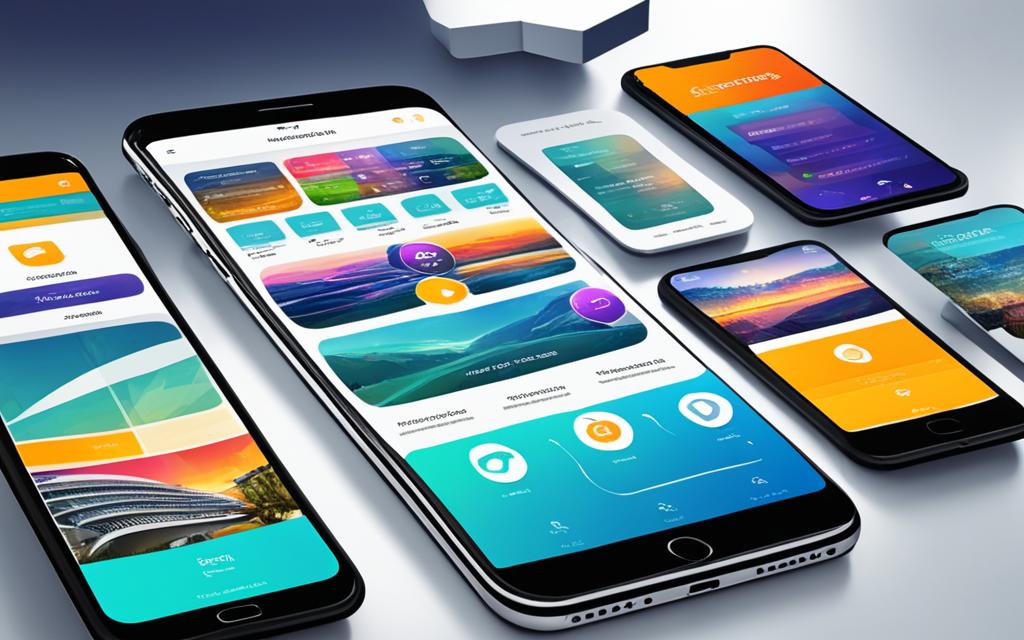
“Mobile app technology empowers developers to think creatively and push the boundaries of what is possible in the leisure app space. With the right app development strategies and a focus on user engagement, innovative leisure apps have the potential to revolutionize how we experience leisure activities.”
Furthermore, app development strategies also play a vital role in fostering innovation in the leisure app market. By adopting agile development methodologies, app developers can iterate quickly and efficiently, allowing them to experiment with new ideas and concepts. This iterative approach enables developers to gather user feedback early on and make necessary improvements to create a truly innovative and user-centric leisure app.
Additionally, keeping up with mobile app development trends is essential for fostering innovation in the leisure app market. Staying updated with the latest technologies and user preferences helps developers understand the evolving needs and expectations of users. By aligning their app development strategies with these trends, developers can create apps that are not only innovative but also cater to the changing demands of users.
Overall, mobile app technology provides developers with the tools and capabilities to foster innovation in the leisure app market. By leveraging these technologies and adopting effective app development strategies, developers can create innovative leisure apps that transform traditional leisure activities into captivating digital experiences. With the ever-evolving trends in mobile app development, the future of leisure apps is poised to become even more innovative and immersive.
Mobile User Experience: The Gateway to Engagement
In today’s highly competitive mobile app market, providing a seamless and enjoyable user experience is paramount to drive user engagement and retention. Mobile app development and design strategies are shifting towards prioritizing user experience to create apps that users love and keep coming back to.
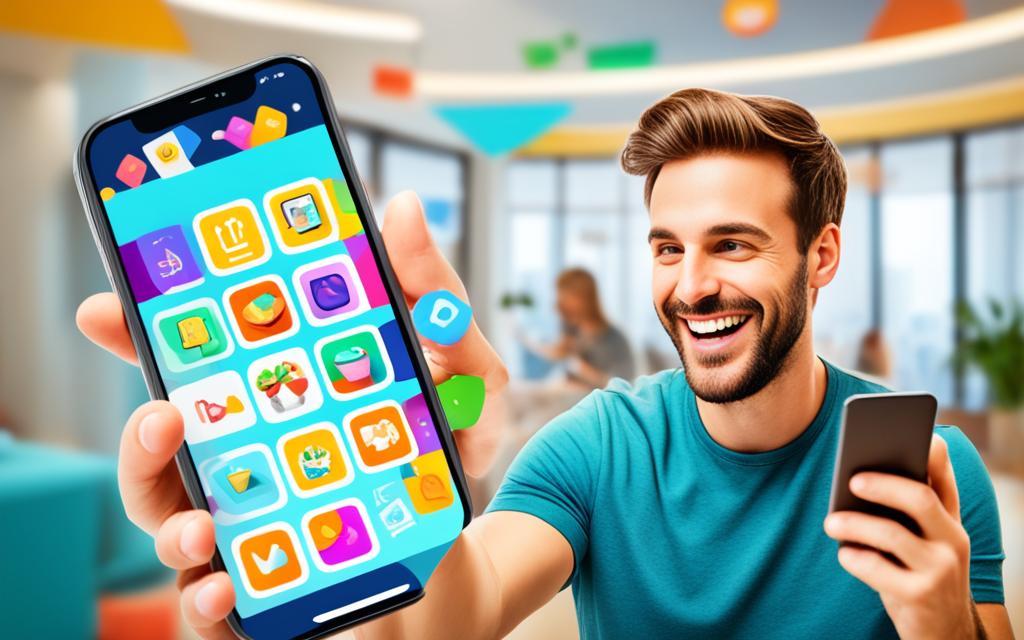
Mobile user experience encompasses every interaction a user has with a mobile app, including the app’s interface, navigation, functionality, and overall usability. A well-designed user experience can significantly enhance user engagement and ensure that users stay connected and actively use the app.
When designing mobile apps, it is crucial to consider the needs and preferences of users. By conducting user research and incorporating user feedback, app developers can gain insights into what users expect and desire from the app. This helps in creating intuitive and user-friendly interfaces that provide a delightful user experience.
To optimize user engagement, app design strategies must focus on simplicity, efficiency, and visual appeal. Clean and clutter-free designs with intuitive navigation can make it easier for users to navigate the app and find what they need. Additionally, optimizing app performance and loading times is essential to prevent user frustration and ensure a smooth user experience.
Furthermore, personalization plays a key role in enhancing user engagement. By leveraging data and user preferences, app developers can tailor the app experience to individual users, providing personalized recommendations, notifications, and content. This level of personalization creates a sense of connection and relevance, making users feel valued and more likely to engage with the app.
The mobile app development landscape is ever-evolving, with new trends and technologies constantly emerging. Staying updated with the latest trends in mobile user experience design is crucial to stay ahead of the competition and meet the expectations of users. As technologies like augmented reality (AR), virtual reality (VR), and voice interfaces continue to evolve, integrating these technologies seamlessly into the app experience can elevate user engagement to new heights.
In conclusion, mobile user experience is the gateway to user engagement in the mobile app industry. By prioritizing user experience, incorporating user feedback, and staying abreast of the latest trends in app design, developers can create mobile apps that captivate and engage users, fostering long-term user loyalty and success.
Conclusion
Throughout this article, we have explored the fascinating world of mobile app development and discussed the latest trends and advancements shaping the industry. We have witnessed how mobile apps are going beyond gaming and transforming leisure into luxurious play, offering immersive experiences that captivate users.
The rise of the metaverse has emerged as a significant influence on mobile apps, providing new avenues for technological convergence and projected market growth. We have also delved into the evolving landscape of app development, app monetization strategies, and the art of creating communities through app architecture.
Augmented and virtual reality have taken the user experience in mobile apps to new horizons, revolutionizing industries like gaming and entertainment. We have also explored the impact of mobile app technology on fostering innovative leisure apps and the crucial role of mobile user experience in driving engagement.
As we look to the future, the potential for mobile apps is limitless. Emerging technologies and design strategies will continue to shape the industry, enhancing the way we interact with apps and creating even more luxurious and transformative experiences. Mobile apps will undoubtedly play a crucial role in the leisure and entertainment landscape, continuously pushing boundaries and delivering exceptional value to users.
